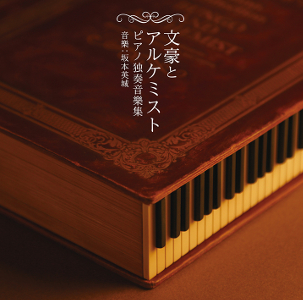Bungo and Alchemist Piano Solo Collection
 |
Album Title: Bungo and Alchemist Piano Solo Collection |
| Record Label: noisycroak Records |
|
| Catalog No.: NCRS-0021 |
|
| Release Date: December 20, 2017 |
|
| Purchase: Buy at Amazon Japan |
Overview
The Bungo and Alchemist Piano Solo Collection features piano arrangements of all the original soundtrack material. Arranged by Kumi Tanioka, Benyamin Nuss, and Takana Miyamoto. How do these arrangers adapt the source material and is the end result worth listening to?
Body
The album opens up with Kumi Tanioka’s set of arrangements. The opening tune, “Rest,” keeps the poignant nature of the original intact with the end result being a delicate, calm, relaxing piano arrangement that doesn’t opt for any frills. On a similar note, “Peace” is quaint and romantic, akin to the original, interpretation that is simple, but meanders at times. I especially like how the original’s pizzicato strings were handled. Her other two adaptations are a bit more urgent in nature. The first, “A Certain Literary Man Who Opposes Urgency” is more engaging from start to finish, compared to the original, and ends up being one of her highlights while the latter, “A Certain Literary Man Who Opposes Undermining,” is an engaging tune that is more menacing than the original. However, I would say that her arrangements, while enjoyable, aren’t the most creative.
Benyamin Nuss tackles the next five arrangements. The first, “Results Announcement ~Victory – Failure~ is a short piano interpretation of the original with no additional embellishment. I feel that it is completely unnecessary, in its current form, and would have been better if it was a longer, more elaborate piece that improvised upon the original’s melody. His other arrangements take inspiration from one of his long time collaborators, Masashi Hamauzu. “The Curator’s Theme” is romantic, while still retaining the style/feel of the original, for the most part. It certainly improves upon the original with the slower sections of the arrangement offering a nice new take on the melody, giving it a more inspired sound. “Circulation of Documents” is more romantic in nature, but still retains the jovial feel of the original, albeit in a less prominent fashion. The end result is quite enjoyable and sports plenty of piano runs. “A Certain Literary Man Who Walks Through Unknown Roads” sounds very much like something that Hamauzu would do for a piano arrangement album. While the power of the original is lost a bit when distilled down to a single instrument, the end result is still a wonderful interpretations that has a very classical air to it and a whimsical feel to it. Lastly, “Bankrupting Cogwheels” keeps the tone of the original, offering a more straightforward take on the piece, albeit with some sections that expand upon the original’s idea. However, it still suffers from the same repetition of the original, no matter how dressed up it is.
Lastly, Takana Miyamoto offers her vision of the final four tunes. “Come, We Might As Well Go and Conquer,” much like the original, doesn’t initially improve upon the original’s lacking melody. The latter half of the arrangement wanders a bit, but I feel this actually helps the piece compared to the original, as the jazz interpretation provides some much needed variation. “Eclectic Dining Room” starts off as a fairly straightforward interpretation of the original, with its bubbly sensibilities, but as it progresses, it turns more towards jazzy chords that give it a nice lounge sound. In a similar progression, “A Certain Literary Man Who Doesn’t Stop Acquring Knowledge” retains the feel of the original in the first half before slowing the tempo down and adding additional jazz touches to give the piece a more romantic feel. The album closes with the titular tune, “The Literary Master and the Alchemist.” While the original is bright and engaging, Miyamoto’s interpretation is absolutely stunning. A more romantic feel and slower tempo really helps this particular interpretation shine, compared to the piano version found on the original soundtrack, despite being a piece that relied on a sweeping ensemble. It’s a beautiful interpretation and an excellent way to close the album.
Summary
The Bungo and Alchemist Piano Solo Collection certainly has something for everyone. For those who enjoy more simplistic piano arrangements, Kumi Tanioka’s arrangements are certainly the ones to look for, while those preferring a sound more akin to a Masashi Hamauzu piano arrangement will most likely enjoy Benyamin Nuss’ interpretations, while those who like a mix of simple/elaborate will more than likely find enjoyment from Miyamoto’s more jazz-laden piano creations. I certainly enjoyed the album more the original soundtrack, but some of the issues I had with the original are still present in the piano renditions, just due to their very nature.
Do you agree with the review and score? Let us know in the comments below!
4
Posted on June 6, 2018 by Don Kotowski. Last modified on June 6, 2018.














